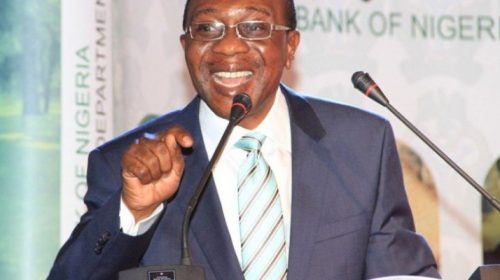Economic Growth: CBN Canvasses Investment In Digital Infrastructure

By Ngozi Onyeakusi—– The Governor of the Central Bank of Nigeria, CBN, Godwin Emefiele, has submitted that investment in digital infrastructure by government will economic growth.
Emefiele gave submission at the 30th edition of the Seminar for Finance Correspondents and Business Editors in Lagos.
According to him, inorder to further drive growth, Nigeria needs to build a solid digital economy, by focusing on digital infrastructure (internet connectivity most importantly), digital literacy and skills, digital financial services, digital platforms and digital entrepreneurship and innovation.
As the biggest economy in Africa with one of the largest youth populations in the world, Nigeria is well-positioned to develop a strong digital economy, he said.
He considered the theme of the seminar very apt in view of the challenging global environment as a result of the COVID-19 pandemic.
“We currently live in an era of unprecedented change, posed by the volatile effects of the COVID-19 pandemic on every sector of life and business globally.
“When the virus broke out in December 2019, we all assumed it would fizzle out within a short time. Not in our wildest imagination did we envisage that it would transform into a full�blown pandemic that would ultimately lead to a significant downturn in economic activities across the globe.
As you are aware, most economies had to undergo various levels of lockdowns.
As a result, households and businesses adapted to these measures by leveraging digital channels to conduct business activities and personal transactions. This led to a surge in demand for digital platforms that promote remote work such as Zoom and Microsoft Teams; along with e-commerce applications that enable digital payments for the purchase of goods and services online.
In Nigeria, said Emefiele, we were able to benefit from some of the measures put in place by the CBN in developing a robust interoperable robust payment system.
Consequently, there is need to focus on accelerating improvements across five fundamental pillars of a digital economy: digital infrastructure, digital platforms, digital financial services, digital entrepreneurship and digital skills.
The presence of these digital channels along with various mobile and web-based
channels has helped to support households and business continuity.
The Governor said it was also critical in mitigating the negative impact of the COVID-19 pandemic on GDP growth in 2020.
According to him, The ICT sector grew
by 14.7 per cent in 2020 relative to growth of 10.16 percent in 2019, adding that as the pace of technological adoption increases, we must find ways to leverage digital channels in improving access to finance and access to credit for all Nigerians.
He argued that the digital economy will be a key factor towards the country’s efforts at driving growth over the next few years.
“As we are all aware, the digital economy is made up of various components, including data analytics, robotics, Artificial Intelligence (AI), machine learning, e-commerce, e- business, e- infrastructure.
” It is based on the interconnectedness of people, organizations, and machines that results from the Internet, mobile technology and the Internet of things (IoT). One of the strongest advantages of technology is that it shrinks time and space and reduces the world as a global village, thereby providing connectivity at the click of a button to anyone anywhere in the world.” he said.
Also, the CBN has over the last decade and half, worked to build an effective and efficient payment system.
The Payment System Vision 2020 strategy document was published in 2007 and the main objective of the strategy was to promote and entrench electronic payments, as the major channel for payment and settlement by all economic agents, away from the current dominance of cash-based transactions.
The robust regulatory framework put in place by the Bank opened up the payment
system to innovation with several new players across in the following licensing categories – Payment Service Banks, Payment
Terminal Service Providers (PTSP’s), Payment Solution Service Providers (PSSP’s), Mobile Money Operators (MMO’s), Payment
Terminal Application Developers (PTSA’s), and Agent Banking.
A combination of these payment initiatives has immensely helped to create employment opportunities and to further our efforts
at building a more financially inclusive economy, added Emefiele.
Today an SME in Ibadan is able to leverage digital channels to sell their products
and services to a wider market beyond their immediate environment
He used the occasion to clarify that the CBN did not place any new restrictions on the use of cryptocurrency in Nigeria.
“Our recent directive only amplified an earlier regulation on the subject of cryptocurrency. The recent directive became necessary to protect the financial system and the generality of Nigerians from the risks inherent in crypto asset transactions, which have escalated in recent times, with consequences on
financial stability and implementation of monetary policy. ” he said.
He said the Banks policy stand does not preclude Nigerians from harnessing the benefits of the underlying technology that support crypto transactions, which is a distributed ledger, commonly referred to as blockchain. There are several examples where blockchain technology has been used to facilitate and improve transparency in the settlement of trade transactions.







Leave a Reply